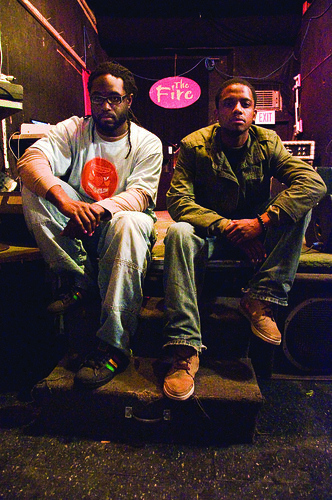
With an enthralling message of environmental, communal and economic issues that potentially damage the psyche and pledge communities, a teenage girl is lost. Not in the sense that she is physically missing but lost in the challenges of her environment. Her story begins after she is raped by a classmate and left to raise a son alone. Her discoveries, misfortunes and triumphs blossom into a beauty that is usually missed by those who are lost on the surface.
Through eclectic elements and sensational sounds that challenge mainstream hip-hop, ((Stereo))type, a local hip-hop duo, is breaking musical barriers.
Temple alumnus Andre “Drematic” Pascoe and Villanova University alumnus David “Dalmar Verite” Brown recently celebrated the release of Ultrasound, their latest album.
Tracks include the hit song “The Grind,” “Poor Man’s Stroll,” “Don’t Leave (Baby Please)” and “2nd Tri.” There are also cameos from other artists including Brandon Tyler, Geovanni and Brittany Mason.
The album release was held in March at the Fire at the Philadelphia Bar & Grille, located at 412 W. Girard Ave.
“Playing at the Fire was a memorable experience,” Dalmar Verite said. “There are few experiences as gratifying as moving crowds.”
((Stereo))type has also performed at World Café Live, the Rotunda, the Underground, the 25th Annual Turks Head Music Festival, PhilaLive at Patterson’s Palace, the Raven Lounge and the Connelly Center at Villanova.
Last month, the group also released its first music video for “The Grind” online. So far, it has received about 1,000 hits.
Continuing to receive hits and sales of the album, ((Stereo))type is a refreshing musical group – nothing close to a stereotype.
According to the group’s biography, “the Philadelphia-based duo blends insightful social commentary, versatile poetic forms and jaw-dropping metaphorical lyricism while boldly forging a unique paradigm that honors the fidelity of black musical heritage.”
((Stereo))type’s lyrical sound confronts mainstream hip-hop culture to mature ideas and empower communities. Moreover, its music challenges people to strive above generational illnesses that have hindered social, political and economic sectors within communities.
Dalmar Verite calls ((Stereo))type’s music “unconventional,” and Drematic calls it “universal.”
“My mission is to help liberate consciousness,” Dalmar Verite said.
“My mission is to raise the bar creatively, in hopes of expanding what people think is possible for music, especially hip-hop,” Drematic said. “My ultimate goal is to be fulfilled creatively and to challenge listeners to demand more from themselves as well as the artists they entrust to entertain them. I’m all about the challenge.”
In 2007, ((Stereo))type came out with a mixtape, The Phillysophical Project.
“They were free, promotional in nature,” Drematic said.
Since then, ((Stereo))type has matured and will continue its growth.
“Five years from now, I plan on being on a much higher level creatively, spiritually, as well as socially, and I hope my art will reflect that,” Drematic said. “In that time period, I plan on expanding the ((Stereo))type musical catalog, creating an effective platform for a handful of artists that I respect, most notably, Brandon Tyler, Y?Arcka, Aquil, Ipso Facto and taking calculated steps to pursue other realms of expression. I plan on taking over pretty much.”
Drematic’s passions for music, journalism, African-American studies, photography and film are inspired by Marcus Garvey, Bob Marley, Nas, Tupac Shakur, Wu-Tang Clan and Spike Lee.
As the leader and founder of the INDIfferent Art Collective, Drematic dabbles in an array of artistic collaborations and provides a source for others who share interest in ushering a rebirth of hip-hop culture.
In contrast to his partner, Dalmar Verite’s inspirations include musicians Chopin, Beethoven, Mozart, J.S. Bach, Miles Davis, Dizzy Gillespie, Duke Ellington, John Coltrane and Nina Simone.
According to his biography, he “seeks to infuse different aspects of many arts to expose the elements in the audio, visual and literary realms.”
For inspiration, Dalmar Verite uses a quote from Dr. Cornell West – an American philosopher, civil rights activist, author and professor.
“Music at its best is the grand archaeology into and transfiguration of our guttural cry, the great human effort to grasp in time – with the most temporal of the arts – our deepest passions and yearnings as prisoners of time,” West said. “Profound music leads us beyond language to the dark roots of our scream and the celestial heights of our silence.”
With a résumé of socially conscious music, ((Stereo))type strives to stay away from hip-hop stereotypes and plans to dynamically elevate the industry.
Trenae McDuffie can be contacted at trenae.mcduffie@temple.edu.



“My mission is to help liberate consciousness,” Dalmar Verite said. I like that quote because it makes them sound more intelligent than your usual typical rapper these days.